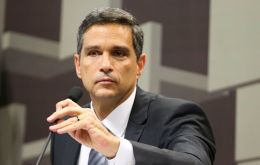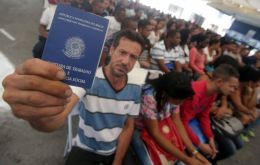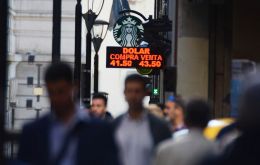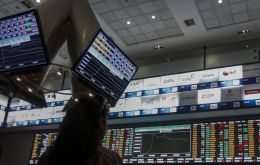MercoPress. South Atlantic News Agency
Tag: economy
-
Saturday, March 30th 2019 - 08:02 UTC
Brazil central bank cautious as outside shocks and domestic political tension mount

Brazil’s central bank will take its time analyzing the economic impact from an increasing number of shocks from abroad and rising political tension at home that appear to be slowing the government’s reform process, its president said.
-
Saturday, March 30th 2019 - 07:55 UTC
Brazil's jobless rate rose for the second straight month and stands at 12.4%

Brazil’s jobless rate rose in February for the second straight month, government data showed on Friday, adding to pressure on new President Jair Bolsonaro to reignite a sluggish economic recovery.
-
Friday, March 29th 2019 - 18:39 UTC
Montevideo: The most expensive city and the best place to live in Latin America?

The Uruguayan capital is the most expensive and the best to live in the region. At least that's what the studies of The Economist, which positioned Montevideo behind Mexico City in terms of cost, and the consultancy Mercer, which places the capital at the top of Latin American quality of life ranking, revealed in publications made this month. El País (Madrid) explains that Montevideo has a “crazy decadent charm”. However, why does this phenomenon occur?
-
Thursday, March 28th 2019 - 09:39 UTC
Argentine Peso slides to an all time low and country risk climbs to almost 800 points

The Argentine Peso slid to all-time lows against the dollar as concerns about inflation, weak growth and October's presidential election weighed. The currency has lost 14% so far this year and the weakness raises fears of a repeat of the currency crisis of 2018 when the Peso lost half its value against the dollar.
-
Thursday, March 28th 2019 - 09:27 UTC
Foreign companies in Brazil becoming impatient with the government of Bolsonaro

Swiss pharmaceutical company Roche said this week it will stop producing medicines at its Rio de Janeiro unit in Brazil, a new blow to a country whose economy appears to be in its most sluggish decade in 120 years. Roche said the move will take place within the next five years because that factory is not financially sustainable.
-
Wednesday, March 27th 2019 - 20:54 UTC
Dollar rises in Uruguay while tension increases in Argentine markets

In Uruguay, the dollar traded at noon on the state bank Banco Republica (Brou) board at $ 33.20 for the purchase and $ 34.60 for the sale, 45 cents above the close price on Tuesday. On the board of private exchanges, the currency to the public came to sell at $ 34.80 and $ 34.90.
-
Wednesday, March 27th 2019 - 08:48 UTC
Argentine financial markets jittery over October elections uncertainty

Investors in Argentina are starting to get the jitters. The gap in yield between local and U.S.-issued bonds has roughly doubled in the last month in the face of stubborn inflation and mounting peso outflows, heaping pressure on President Mauricio Macri ahead of elections later in the year.
-
Saturday, March 23rd 2019 - 09:09 UTC
UK and US markets tumble on fears of a global slowdown

Markets in the UK and US have tumbled with analysts attributing the drop to growing fears of a global slowdown. The FTSE 100 saw its worst day of trading this year, closing 2% lower. In the US, the three main indexes ended between 1.9% and 2.5% lower.
-
Saturday, March 23rd 2019 - 09:06 UTC
Temer's arrest and military pensions' reform brings down Brazilian stock market and weakens currency

Brazilian stocks fell sharply on Friday as the arrest of the country’s former president, Michel Temer, sparked worries that government debate over key fiscal reforms may be delayed.
-
Friday, March 22nd 2019 - 09:40 UTC
Brazil's central bank with new chief leaves rates unchanged; policy is determined “with caution and serenity”

Brazil's interest rates remained unchanged on Wednesday after the central bank held its first monetary policy meeting under its new chief Roberto Campos Neto. The central bank's unanimous decision -- only the second since pro-business President Jair Bolsonaro took power in January on a promise to revive Latin America's biggest economy -- to keep rates at 6.5% was in line with market expectations.
